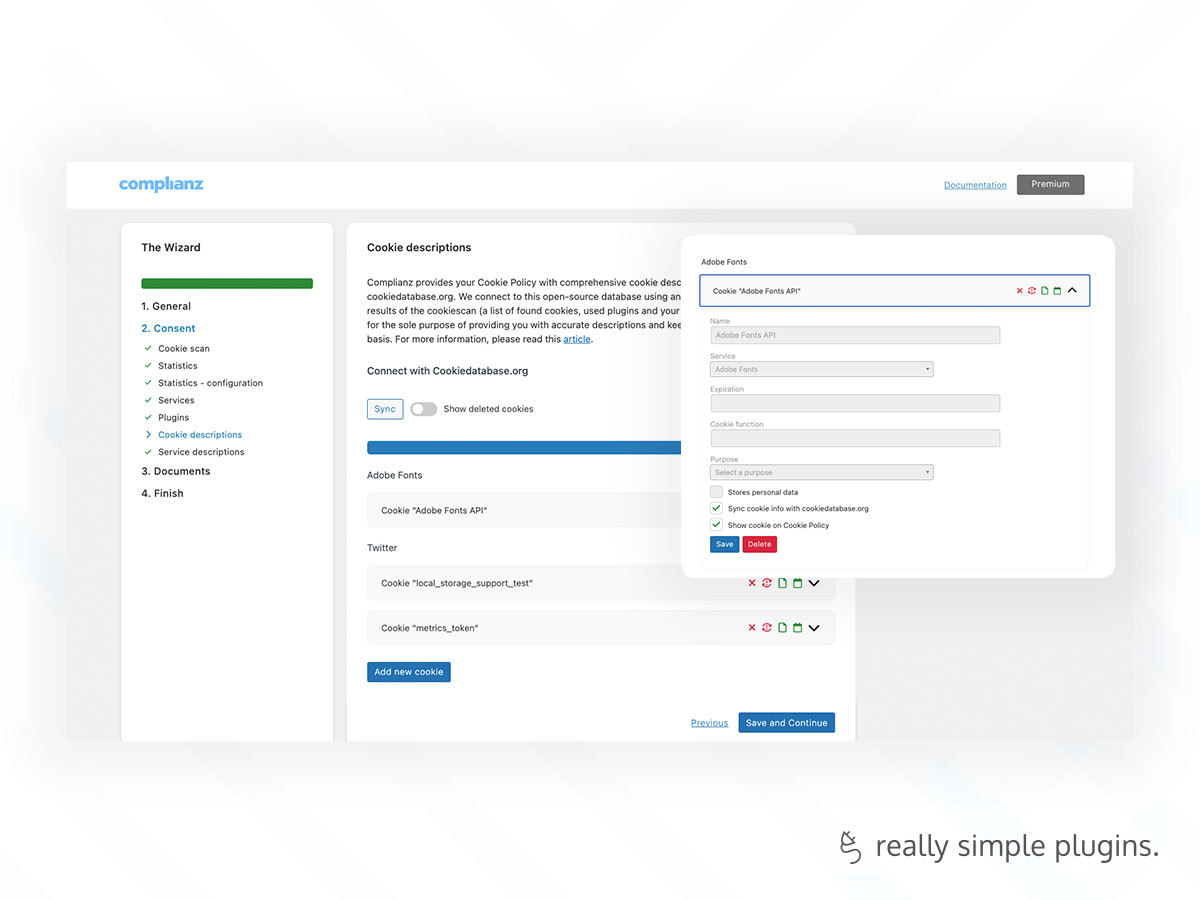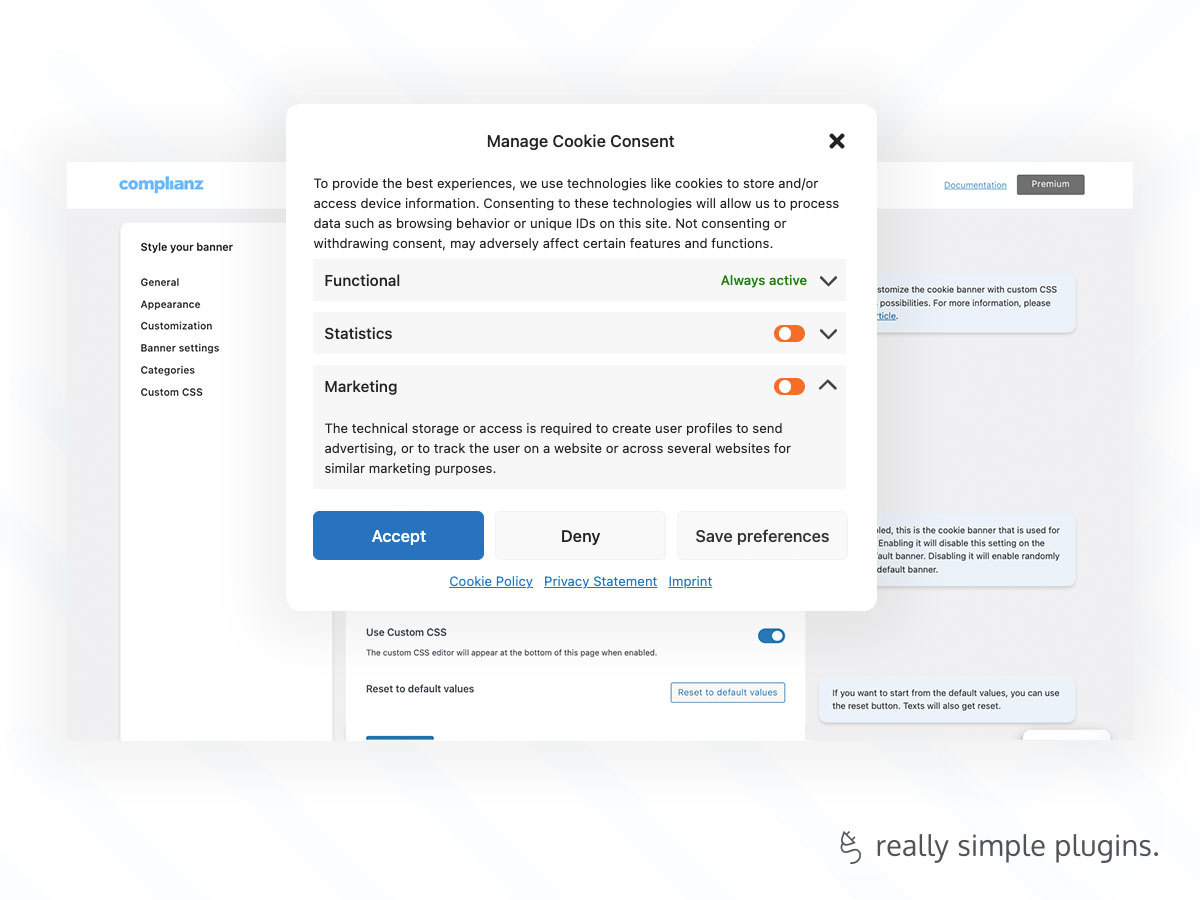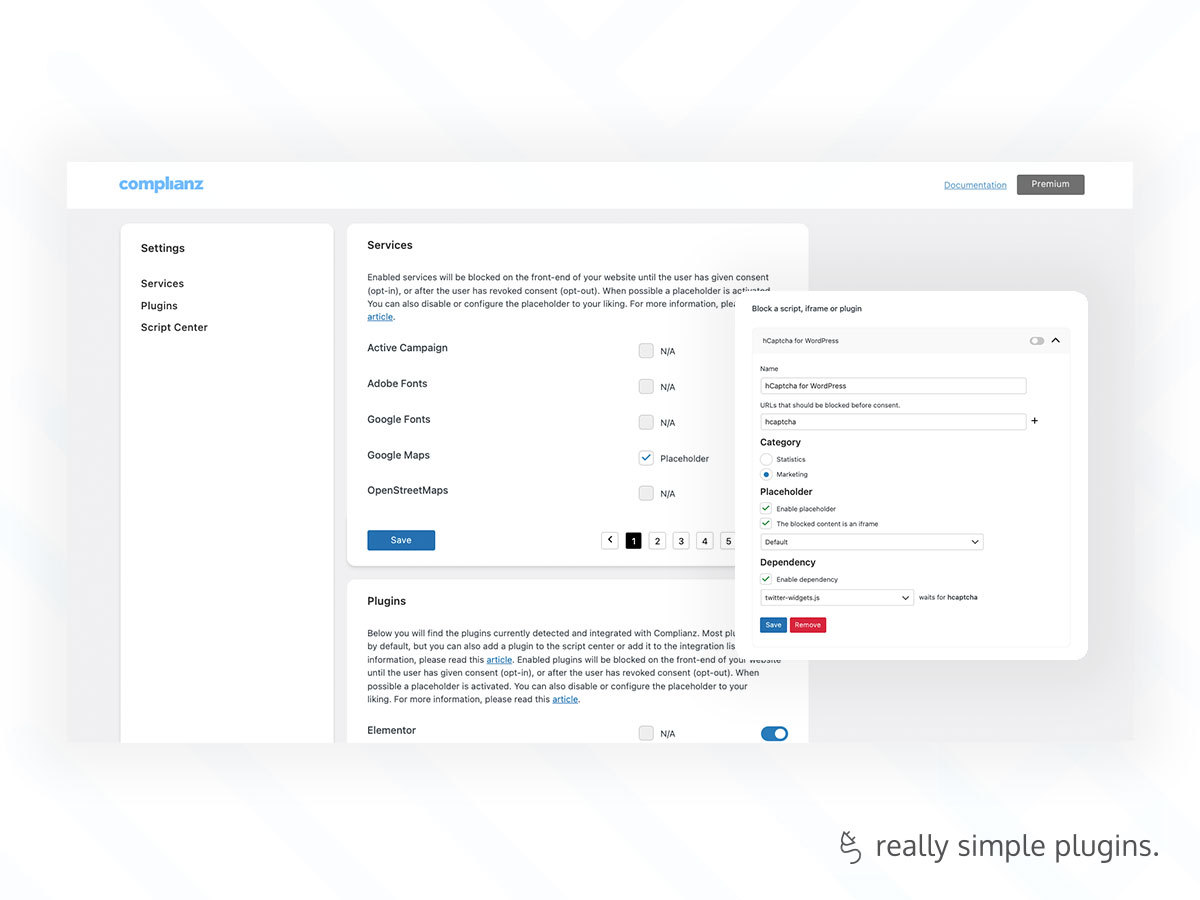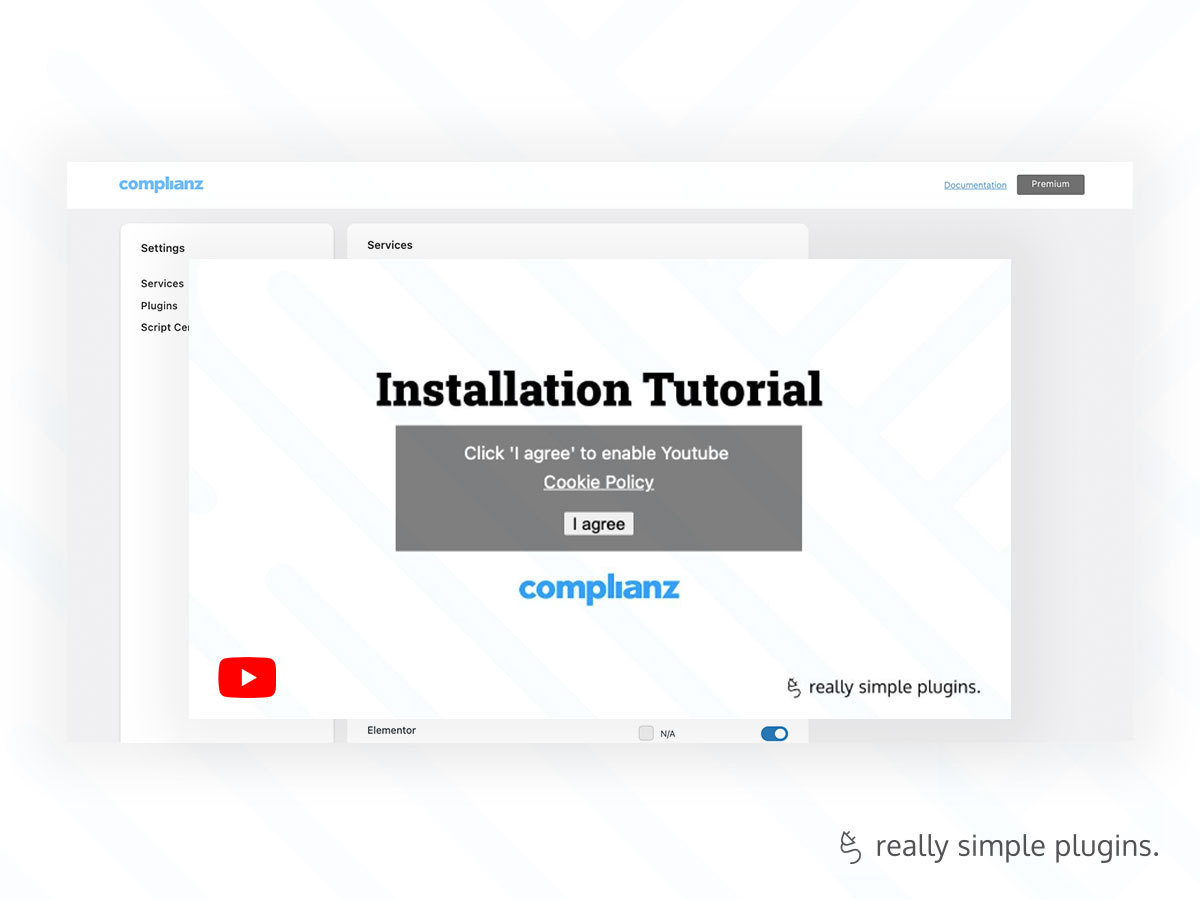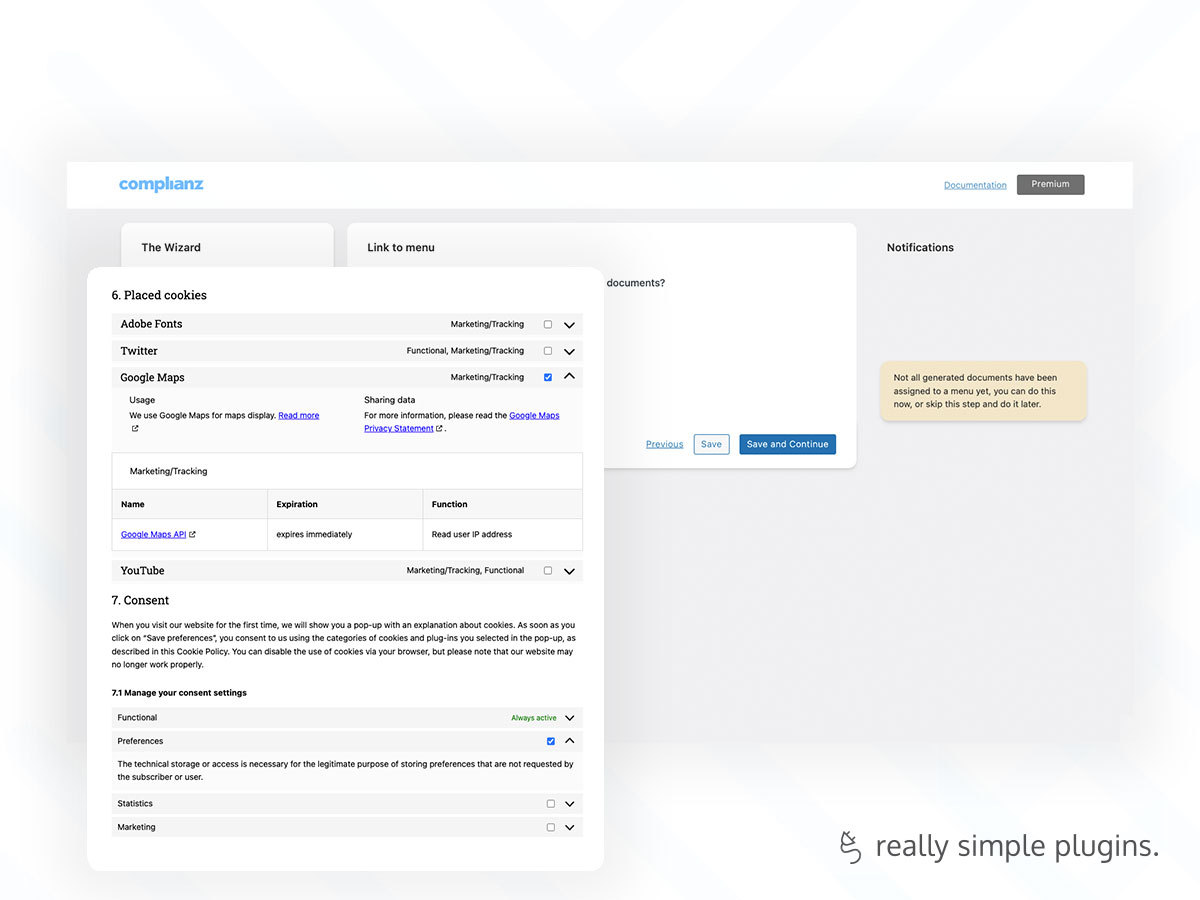
Complianz - GDPR/CCPA Cookie Consent
| 开发者 |
RogierLankhorst
aahulsebos leonwimmenhoeve paapst markwolters mujuonly xantek pierrotevrard samu-d tomeijkelenkamp hesseldejong samu-dn jarnovos |
|---|---|
| 更新时间 | 2024年10月9日 17:40 |
| 捐献地址: | 去捐款 |
| PHP版本: | 7.4 及以上 |
| WordPress版本: | 6.5 |
| 版权: | GPL2 |
标签
下载
详情介绍:
安装:
- Go to “Plugins” in your WordPress Dashboard, and click “Add new”.
- Click “Upload”, and select the downloaded zip file.
- Activate your new plugin.
- Use our tour to get familar with Complianz.
屏幕截图:
常见问题:
Knowledgebase
Complianz maintains a continuously growing knowledgebase about GDPR, including subregions e.g. DSGVO and CNIL, CCPA, PIPEDA, COPPA, POPIA & other specific laws on complianz.io
Is my website GDPR, COPPA, CCPA, DSGVO, TTDSG, AVG, CNIL, UK-GDPR, PECR, CASL, LGPD, POPIA and/or PIPEDA compliant with this plugin?
We cannot guarantee compliance for your website. A correct configuration of this plugin by a website administrator is always required.
When do I need a Cookie Notice?
Complianz | GDPR/CCPA Cookie Consent will determine this automatically based on the laws of the region or regions, where most of your visitors come from. Regarding CCPA/CPRA, you always have to show which cookies you are using but there's no obligation in asking consent.
Do I always need a consent checkbox on contact forms?
Not always. The Complianz Privacy Suite Premium plugin can determine if you need this, based on your answers in the wizard. It mainly depends on the type of information and the reason why your visitor use the contact form.
What is the GDPR?
The GDPR is a regulation within the EU law on privacy and data protection for any citizen within the EU and European Economic Area. It aims primarily on giving control to individuals over their personal data. The GDPR also addresses the export of personal data outside the EU.
What is the CCPA?
The CCPA (Californian Privacy Act) is a law set up by the Californian government. The law is adjudged to be one of the toughest and farthest-reaching consumer privacy laws in the US. It is mostly focused on giving insights on what personal data business gather and how to protect and control these personal data.
What is COPPA?
The Children’s Online Privacy Protection Act (COPPA) is a law designed to protect the online privacy of children under 13. It was set up in the 1990's and states that website owners have to meet certain requirements regarding visitors with the age under 13.
What are PECR & UK-GDPR?
PECR (UK) covers the use of cookies and similar technologies for storing information and accessing information stored, on a user’s equipment such as a computer or mobile device.
What are the Privacy Act 1988 & Australian Privacy Principles
To comply with the Australian privacy laws a website operator should present a cookie policy and/or a privacy notice before or, if that is not practicable, as soon as practicable after, your website collects personal information about an individual.
What are PIPEDA & CASL?
Canada’s Anti-Spam Legislation (CASL) and Personal Information Protection and Electronic Documents Act (PIPEDA) require a website operator to obtain consent, either implied or express consent with a dedicated cookie statement.
What POPIA (POPI Act)?
POPIA is the acronym for the South African PROTECTION OF PERSONAL INFORMATION ACT. Similar to the GDPR, the UK-GDPR, and the Brasilian LGPD, it promotes the protection of personal information processed by public and private bodies, regulates the cross-border flow of personal information, and outlines the rights of data subjects.
What are “Marco Civil” and the Brazilian General Data Protection Law (LGPD)?
The Brazilian General Data Protection Law is similar to the GDPR, the UK-GDPR it promotes the protection of personal information processed by public and private bodies, regulates the cross-border flow of personal information, and outlines the rights of data subjects. The Marco Civil is the Brazilian name of the Brazilian Civil Rights Framework for the Internet a counterpart to European's "ePrivacy", although not similar.
Can I create a Cookie Wall with this plugin?
With some custom CSS this is possible, but we do not consider a cookie wall to be GDPR compliant, so it's not actively supported. We do, however, have the option to create a Soft Cookie Wall. Which blocks interaction with the website, but dismissing remains a possibility.
更新日志:
- May 14th, 2024
- Improvement: Updated Google Site Kit integration
- Improvement: Detection of pages with shortcode query improved for sites with a lot of pages
- Improvement: limit above query to pages only, props @georgestephanis
- Fix: get_required_pages not existing for documents rest_api endpoint, causing a fatal error
- Fix: Data is shared with this service not saving in cookies overview
- April 29th, 2024
- Fix: compatibility with Meta Slider plugin
- Fix: unexpected behaviour when editing a new, unsaved script block in the script center
- Fix: Detection of Really Simple SSL pro in other plugins section
- Fix: don't replace style src with #, as this reloads the entire page as style src, props @smerriman
- Fix: prefill administrator email in onboarding email
- Fix: undefined array key placeholderContent in Block Editor block
- March 9th, 2024
- Fix: Purposes were incorrectly set to 'disabled', while there should only be a condition limiting it to the US region only, props @cdhodgdon
- Fix: Pixelyoursite + pinterest function name incorrect, props @theogk
- March 5th, 2024
- Improvement: clean up MPDF temp directory after pdf generation
- Improvement: set aria label on x close button from banner
- Fix: deleting cookies with disallowed cookie names causing fatal error, props @baffled
- Fix: missing cmplz_deny_all() function for expired cookies with a changed cookie policy id.
- Fix: cmplz_set_category_as_body_class() also iterating over objects instead of just class names, when parsing the body classes, props @tomnoir
- Fix: due to changed setting usage, Complianz assumed TCF active in some situations, causing the banner editor not to function properly, props @vania2008, @jeanfrancois7
- February 28th, 2024
- Fix: force the 'wizard_completed_once' to be true for upgrades to 7.0.2, to prevent issues with banner not showing after upgrade, props @cometto, @riroweb2022, @katynen, @julianulmer, @iviadvagency
- February 27th, 2024
- Fix: catch COMPLIANZ class not loaded yet in cmplz_get_option, props @sizilianischekueche, @franktomas, @martinellimarco, @boinich
- February 27th, 2024
- New: Rework codebase to React Framework
- New: Hybrid cookie scan
- New: Menu-item 'Tools'
- New: Set cookies on root domain
- New: Search for plugins and services
- New: Statistics block on dashboard
- New: Onboarding
- New: consent mode
- New: Greenshift + YouTube integration
- Improvement: INP performance optimisation
- Improvement: catch not isset region
- Improvement: add banner title to css class
- Improvement: extend YoTuWP blocklist
- Improvement: whitelist video lightbox in Beaver Builder
- Improvement: allow text in Clarity ID input field
- Improvement: DNSMPI feedback on form
- Improvement: Dropped temp dir from MPDF generation, props @piccart
- Improvement: use custom transient to lower number of database requests
- Improvement: Added a filter to delete Records of Consent if older than X days
- Improvement: E-mail obfuscation now uses the antispambot() function
- Improvement: Consent area on a Twitter embed no longer links to Twitter
- Improvement: Improvement: Added translatable aria-label
- Fix: Elementor popup blocked content not unlocking on refresh
- Fix: per site activation of single site plugin on multisite
- Fix: include banner id in cache key for page links, to ensure different banner data is respected across banner ids.
- Fix: jQuery exists check in Elementor integration
- Improvement: prevent administrator from saving javascript in the css editor
- October 12th, 2023
- Fix: also clear localstorage & sessionstorage with cookie shredder
- Fix: With only Canada in opt out mode selected, the question 'will you self host Google Fonts' was not visible
- Improvement: setting a class on the parent div of a placeholder with height inherit resolves css issues on some themes, props @maxineblack
- Fix: compatibility with WP Rocket when some iframes are lazy loaded, but not all.
- September 20th, 2023
- Improvement: upgrade MPDF version to 8.1.3
- Improvement: prefix 'request' to prevent conflicts with weglot
- Fix: bug in Divi Recaptcha integration
- Fix: Block Editor dropping styles when in unsynced mode
- Fix: Consent Mode moved to banner_loaded hook to ensure loading
- 08-08-2023
- Improvement: Tested up-to WordPress 6.3
- 11-07-2023
- Fix: catch missing $slug when another plugin drops the slug property
- 10-07-2023
- Improvement: restore php 7.2 support in burst installer
- Improvement: catch server configurations not supporting webp
- Improvement: catch not existing file when generating webp
- Improvement: catch not existing $slug property in auto updates check
- Improvement: catch not existing ID in wordpress $post when checking for summary divs
- 04-07-2023
- New: placeholders converted to wepb, loaded with lazyloading, props @james-feaver, @asafm7
- Fix: CAOS host analytics locally integration fixed after constant was dropped
- Fix: DNT caused wp_has_consent to always return false, which should not be the case if consent is given on a service specifically
- Fix: no rt_ prefix on Tag Manager events
- Fix: PHP 8.2 warnings of dynamically created properties
- Fix: When TCF active, in some cases this could cause a cmlz_accept_all not defined error
- Fix: Fatal error in Wizard when using "Falang", props @chabass
- Fix: cookies can not able to run in some cases due to missing variable declarations, props @sira1967
- June 14th, 2023
- Fix: WordPress 6.2 version moved the Privacy Policy function to a different file. Added fallback for older versions.
- Fix: The fix for the Classic Editor bug which removes summary/details html elements, caused an issue when the post content is empty.
- Improvement: if configuration by Complianz is set to false, the gtag id was added anyway, but empty.
- Improvement: strings in UK cookie policy translatable, which shouldn't be the case.
- Improvement: unhide pagination on data requests page.
- Improvement: Jersey and Guernsey included
- Improvement: move nonce check to earlier in the process
- Improvement: only show notice about duplicate statistics implementation if stats are actually used.
- Improvement: Easy Liveblogs integration
- Fix: Workaround for strange issue where the Classic Tiny MCE editor strips the summary/details tags from the unsynced legal documents html
- Security: CSRF fixed
- Fix: type=module support for scripts other than inline scripts
- Fix: new shortcode handling for consent area not working for some plugin shortcodes, split in two options: default, the old one, optionally the clientside version.
- Fix: catch not existing post_data if post structure is not following WordPress standards
- Fix: exclude bricks builder from cookie blocker
- Improvement: AddToAny integration updated, props @micropat
- Improvement: wording and links in Canadian Cookie Policy
- Improvement: mailchimp woocommerce integration feature activation after consent
- Improvement: updated classic consent area to the same new structure as the new Gutenberg consent area
- Improvement: script type module support in cookie blocker
- Improvement: exclude cornerstone builder from cookieblocker
- Improvement: new cmplz_upload_dir and cmplz_upload_url filters, to allow overrides of the plugin folders.
- Dropped: Ultimate Add ons for Elementor integration, due to incompatibility issues
- Improvement: add exclude cookies filter
- Improvement: add support for parent/child themes, props @dominiccarrington
- Improvement: incorrect bold paragraphs in Privacy Statement for Children
- Improvement: clear blocked scripts cache on ajax save in script center
- Improvement: hubspot integration improved
- fix: cmplz-consent-area shortcode reload loop because of hardcoded marketing category, props @matthiaswagner
- New: branding update
- Security update: authenticated Stored XSS issue
- Fix: disable cookie banner option in wizard didn't load the complianz.js scripts, causing placeholders not to work when activated.
- Fix: After switching to unlinked status in a legal document, purpose paragraph got dropped
- Fix: not all categories within services showing in cookie policy overview
- Fix: isset check on get_field_type function, props @moxymore
- Fix: not translatable VAT ID string
- Fix: With Global Privacy Control or Do Not Track enabled, and the user accepting an embedded service, the service was blocked again after a pageload.
- Improvement: allow custom directory for cookie banner css generation
- Improvement: catch open basedir restriction
- Improvement: catch not existing accept button during initial cookie scan (no banner active yet)
- Improvement: function cmplz_has_consent() in 'other' region returned false when no cookies present, while it should return true in that case.
- New: Buttonizer integration
- New: hCatpcha for WordPress
- Improvement: do not copy over async attribute to prevent issues re-initializing scripts in some setups
- Improvement: get_cookie() function performance, props @lucastello
- Improvement: add space behind contact details on policy
- Improvement: add our own 'manage_privacy' capability, as the wordpress core manage_privacy_options is not implemented consistently with other capabilities
- Improvement: catch not set array class-document.php 1820
- Improvement: hide blocked iframes until they're consented to, for better UX
- Improvement: PHP 8.2 compatibility
- Improvement: export datarequests on symlinked folder setups (BASE_PATH -> ABSPATH)
- Fix: links to processing agreement create page broken
- Fix: Divi Recaptcha support
- Fix: WP Go Maps Pro update
- Fix: cosmetic change: cmplz_functional should always be allow, props @jidwictut9
- Fix: when editing consent in unsynced mode in Gutenberg, content went missing because of automatically wrapping with divs by gutenberg and missing key props
- New: Agile Store Locator integration
- New: Omnisend Connect integration
- Fix: function name error in microsoft ads integrations, props @mustafauysal
- Fix: GPC & DNT in opt out regions not respected, props @ahegyes
- Improvement: conditional scroll into view on consent area shortcode, props @falkemediawy
- Improvement: MPDF update, props @sviluppomania
- Improvement: catch CURL errors because of local SSL issues, add to system status
- Improvement: return # for not existing page id in case of generated docs by complianz, but not actually generated
- Improvement: Fire load event in divi integration after consent
- Brought version in sync with premium version
- Improvement: Add classes to address details
- Improvement: auto installer for Really Simple SSL multisite compatible
- Improvement: add filter to allow filtering data-request email recipient 'cmplz_datarequest_email'
- Improvement: translatable URLs in polylang
- New: Microsoft Ads/Microsoft Clarity integration
- Fix: some scripts not executing properly because of copying data-service & data-category attributes props @sophiaknows, @hamil1
- Fix: new added query added to cookie block exclude to ensure Avada live builder works, props @franck_b, @markusand

